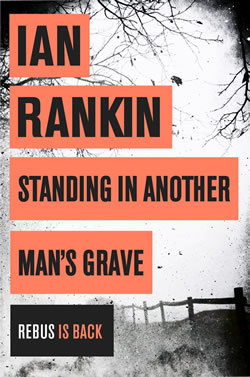Welcome back to the Lothian & Borders Police force, John Rebus.
On second thought, hold on a moment. You’re actually not so welcome back after all, you crusty, IPA-quaffing, single malt-drinking, doggedly old-school investigative iconoclast. At least not to your Scottish colleagues in the Edinburgh cop shop, who don’t approve of your rule-breaking, not-familiar-with-the-Internet, consorting-with-known-criminals ways.
Those bureaucratic types have no use for your hunches, after-lunchtime beer breath, and Led Zeppelin- and Rory Gallagher-referencing ways. They would have been all too happy if your creator had left the number of Rebus novels at 17, and done away with you for good with 2007’s “Exit Music.”
Ian Rankin’s readers, on the other had, are sure to feel differently. Since he put his not entirely cynical, much-loved protagonist aside, the prolific author stumbled with the stand-alone thriller “Doors Open” in 2008 before finding his feet with “The Complaints” (2009) and “The Impossible Dead” (2011).
Those two Edinburgh-based police procedurals each featured Malcolm Fox, an internal affairs investigator who doesn’t drink or care for music. Despite Rankin’s seeming determination to turn him into an almost colorless anti-Rebus, those novels are thoroughly involving and sure-footed, and the reader is won over by Fox’s complexity and rock-solid decency.
Fox is no Rebus, however. And from the opening scene in which the semi-retired detective — now working as a part-timer for the Serious Crimes Review Unit, which is Scottish cop talk for cold case division — is standing in the rain at a funeral thinking about how badly he needs a smoke, we’re delighted to have the dour old Tartan noir detective back in action.
The case that drives “Standing in Another Man’s Grave” involves a teenage girl who had vanished in 1999. Through diligent application of shoe leather, Rebus links her to a series of similar disappearances over the years. All of the presumed dead women had been traveling along the A9, a route that runs from Edinburgh north through the Scottish Highlands to Inverness. Rebus traverses the road in his huffing, puffing old Saab, saluting distilleries he passes along the way and even occasionally noticing the otherworldly beauty of the landscape.
For his trouble, Rebus is treated with suspicion by his superiors. And as a no longer full-fledged member of the force (who is considering rejoining full time, if he can pass the physical), he’s forced to cut corners and pretend he has more authority than he has. He’s even treated, at first, with a certain wariness by his former protegee, Siobhan Clarke, the rising detective inspector who Rankin readers have been patiently waiting to see in a book of her own. She’s wary that teaming up with her antiauthoritarian mentor — whose unorthodox methods include regular meet-ups at the Oxford Bar with also semiretired crime boss Big Ger Cafferty — might be bad for her career.
Then there’s the problem of Malcolm Fox. With Rebus flouting regulations and Fox in charge of investigating other cops, it makes perfect sense that the two characters would butt heads. In the novel’s only real wrong move, however, Rankin botches the opportunity. After Fox was so conscientiously developed in the books in which he’s the protagonist, he’s a cardboard cutout here, a bluenose boy scout out to spoil all of Rebus’ fun. It’s as if Rankin were incapable of fully empathizing with two three-dimensional characters of equal gravitas in the same book.
That’s a forgivable flaw because Fox is largely kept to the sidelines, and Rankin is so deeply comfortable with Rebus. Whether living on a diet of Irn-Bru and sausage rolls and stifling a belch as he comes in for a carpeting from some small-minded pencil pusher, or wondering where he went so wrong as a father that when he drops by his daughter’s house unannounced, he’s secretly hoping she’s not there, Rebus remains as fascinatingly complex and gruffly engaging as ever.
Retirement will not suit him, or Rankin’s readers.
Send questions/comments to the editors.



Success. Please wait for the page to reload. If the page does not reload within 5 seconds, please refresh the page.
Enter your email and password to access comments.
Hi, to comment on stories you must . This profile is in addition to your subscription and website login.
Already have a commenting profile? .
Invalid username/password.
Please check your email to confirm and complete your registration.
Only subscribers are eligible to post comments. Please subscribe or login first for digital access. Here’s why.
Use the form below to reset your password. When you've submitted your account email, we will send an email with a reset code.